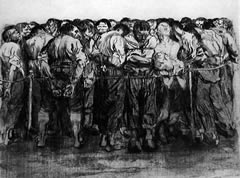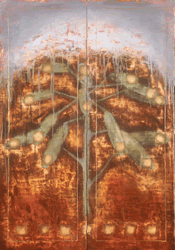
Die Gefangenen, “The Prisoners”
Kathe Kollwitz, 1908
Kathe
Kollwitz was born in East Prussia in 1867. She studied art in Berlin
and in 1932 she was one of a group of socialists who signed an appeal
of
unity
against
the Nazi
Party.
After Adolf
Hitler
gained
power,
she
was forced to resign from the Prussian Academy of Arts. She died
in 1945.
If
you have ever been captured, if you have ever endured hambre
del alma, a starvation of soul, if you have ever been trapped...
Clarissa Pinkola Estes [12]
In the quote above, Estes is addressing the plight of women who have lost their natural instincts and ended up in situations detrimental to spirit. She goes on to say that these women are usually “extremely hungry for something soulful”, that they will often take “any poison disguised on a pointed stick, believing it to be the thing for which [their] soul hungers.” This is, needless to say, a fate that descends on many of us at one time or another, both women and men. [13]
There are websites [14] on the internet where you can read dream after dream of incarceration in a concentration camp or being burnt at the stake. From the comments posted on these sites it appears that many of the dreamers seem to believe that this is evidence of a past life—a distancing defence that is often necessary to ensure stability in the midst of current emotional trauma.
However it is important, at some point, to discover what part of us—symbolically imprisoned or incinerated in these dreams—that has been cast off as undesirable or heretical. For this is something we are all capable of doing to ourselves—at times in an attempt to keep in favour with a disapproving spouse, parent or culture, at others because we ourselves are ashamed and seek to repress unwanted characteristics or talents.

“Seed/Bud” by
Patricia
Miranda [15]
Our
priests, I ask of you:
From whence comes the enrapturing flowers?
The songs that intoxicate, the lovely songs?
Nahuatl icnocuicatl, ‘song of reflection’
In the passage above, this anonymous Aztec poet could be putting forth a challenge: do the priests really know the source of creative power? If so, why did they never make the connection that the required ‘sacrifice of heart’ might indeed be symbolic—that rather than a literal pouring out of blood could it not be the living of one’s gifts that sanctifies a person’s heart, making it yolteotl, one with the divine?
There are fallow seasons in the natural cycle of soul, dark nights when a drought in one’s outward existence can be indicative of inner incubation, and it takes experience to be able to distinguish this type of quiescence from stagnation that is more detrimental to spirit. There are undoubtedly many horrible things that can happen during the course of a life, things that one might be lucky to survive. But in the end the health of one’s spirit is the responsibility of the individual. The deepest seeds of soul need to be nurtured with water from an unpolluted source, not wine from a poisoned chalice. We must all learn to say no to thoughts and beliefs that diminish rather than expand us—however intoxicating they might seem at the time.